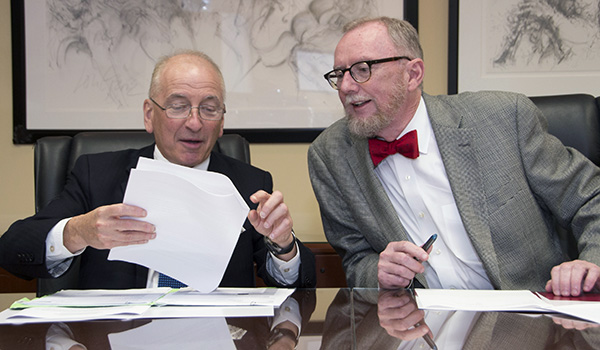
Clayton State President Hynes, left, and GPC President Watts sign 2+2 articulation agreement between the two colleges. (photo by Bill Roa)
GPC signs teacher education agreement with Clayton State
Students who want to become high school teachers now can take their first two years of college at Georgia Perimeter College and finish their degrees at Clayton State University, thanks to a new agreement between the two institutions.
Georgia Perimeter and Clayton State launched the articulation agreement for secondary teacher education students this fall. Rob Watts, GPC interim president, and Dr. Thomas "Tim" Hynes, president of Clayton State, signed the official documents at GPC’s Decatur Campus.
The new 2+2 agreement allows Georgia Perimeter students who earn their Associate of Science in Teacher Education to transfer seamlessly to Clayton State to finish their bachelor’s degrees in teaching.
Students will be certified secondary education (high school) teachers after graduating from Clayton State’s program, says Dr. Ursula Thomas, GPC’s director of field experience and assessment for teacher education.
“This semester alone, we have more than 200 students in teacher education—and 40 percent of these students have stated their interest in middle grades and secondary education,” says Thomas.
The two schools plan to launch a similar program for their middle school teacher education students in fall 2015.
Teacher education courses are available on all five GPC campuses and online. As part of the associate degree program
At GPC, these students are must post at least 30 hours of classroom observations and volunteer service in schools before completing their associate degrees. GPC has agreements with 27 public school districts across the state, as well as an additional 41 for-profit and non-profit academic institutions, where students volunteer.
When students become seniors at Clayton State, they will perform their student internships at school districts that have agreements with the state university.
“We hope this agreement will improve the ability of our schools to produce more teachers for the state—and increase the number of high school teachers who are well prepared in their pedagogy,” says Dr. Ruth Caillouet, chair of Clayton State’s Teacher Education Department in the College of Arts and Sciences.
